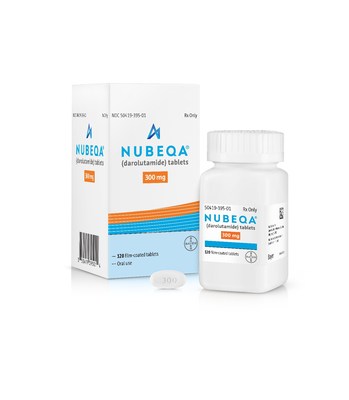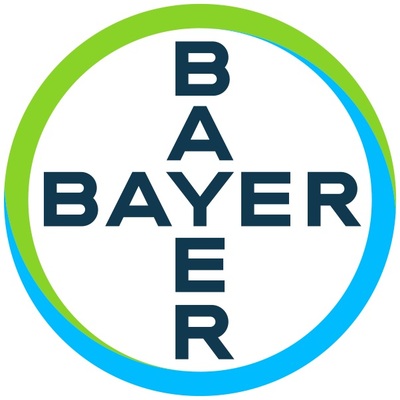The U.S. Food and Drug Administration (FDA) today approved Nubeqa® (darolutamide), an androgen receptor inhibitor (ARi), for the treatment of patients with non-metastatic castration-resistant prostate cancer (nmCRPC)
|
WHIPPANY, N.J., July 30, 2019 /PRNewswire/ -- The U.S. Food and Drug Administration (FDA) today approved Nubeqa® (darolutamide), an androgen receptor inhibitor (ARi), for the treatment of patients with non-metastatic castration-resistant prostate cancer (nmCRPC).1 The FDA approval is based on the Phase III ARAMIS trial evaluating Nubeqa plus androgen deprivation therapy (ADT), which demonstrated a highly significant improvement in the primary efficacy endpoint of metastasis-free survival (MFS), with a median of 40.4 months versus 18.4 months for placebo plus ADT (p<0.0001).1 MFS is defined as the time from randomization to the time of first evidence of blinded independent central review (BICR)-confirmed distant metastasis or death from any cause within 33 weeks after the last evaluable scan, whichever occurred first. Nubeqa was approved under the FDA's Priority Review designation, which is reserved for medicines that may provide significant improvements in the safety or effectiveness of the treatment for serious conditions. "Patients at this stage of prostate cancer typically don't have symptoms of the disease. The overarching goals of treatment in this setting are to delay the spread of prostate cancer and limit the burdensome side effects of therapy," said Matthew Smith, M.D., Ph.D., Director of the Genitourinary Malignancies Program, Massachusetts General Hospital Cancer Center. "This approval marks an important new option for the prostate cancer community." In the U.S., over 73,000 men are estimated to be diagnosed with castration-resistant prostate cancer (CRPC) in 2019.2 About 40 percent of these patients have prostate cancer that has not spread to other parts of the body and is also associated with a rising prostate-specific antigen (PSA) level, despite a castrate testosterone level, which is known as nmCRPC.2,3 This is important because about one-third of men with nmCRPC go on to develop metastases within two years.4 PSA monitoring is important to identify patients and help offset undertreatment in men before the disease spreads.5,6 "We know that men with nmCRPC are still in the prime of their lives and are at a critical point in their disease when action needs to be taken," said Howard R. Soule, Ph.D., Executive Vice President and Chief Science Officer, Prostate Cancer Foundation (PCF). "For 26 years, PCF has been focused on research aimed at improving patient outcomes and we welcome the addition of new treatment options that provide men with more choices when working with their doctor to select what's right for them." "With the approval of Nubeqa, we now have a new therapy that extends MFS and allows physicians greater flexibility to treat men living with nmCRPC," said Robert LaCaze, Member of the Executive Committee of Bayer's Pharmaceuticals Division and Head of the Oncology Strategic Business Unit at Bayer. "Bayer is proud to take this latest step forward in the nmCRPC treatment landscape. Nubeqa is the newest addition to our prostate cancer portfolio and reflects Bayer's commitment to finding treatments for men at different stages along the prostate cancer continuum." In the ARAMIS trial, both arms showed a 9 percent discontinuation rate due to adverse reactions.1 The most frequent adverse reactions requiring discontinuation in patients who received Nubeqa included cardiac failure (0.4 percent), and death (0.4 percent).1 Adverse reactions occurring more frequently in the Nubeqa arm (≥2 percent over placebo) were fatigue (16 percent versus 11 percent), pain in extremity (6 percent versus 3 percent) and rash (3 percent versus 1 percent).1 Nubeqa was not studied in women and there is a warning and precaution for embryo-fetal toxicity.1 Overall survival (OS) and time to pain progression were additional secondary efficacy endpoints.1 OS data were not yet mature at the time of final MFS analysis.1 The MFS result was supported by a delay in time to pain progression, defined as at least a 2-point worsening from baseline of the pain score on Brief Pain Inventory-Short Form or initiation of opioids, in patients treated with Nubeqa as compared to placebo.1 Pain progression was reported in 28 percent of all patients on study.1 Bayer has filed for approval of Nubeqa in the European Union (EU), Japan, and with other health authorities. Nubeqa is developed jointly by Bayer and Orion Corporation, a globally operating Finnish pharmaceutical company. Nubeqa will be available in oral tablets for adults.1 For more information, visit www.NUBEQA.com. Value Program for Nubeqa Patients Clinical Trial Results The primary efficacy endpoint of the trial was MFS, defined as the time from randomization to the time of first evidence of BICR-confirmed distant metastasis or death due to any cause within 33 weeks after the last evaluable scan, whichever occurred first.1 Nubeqa plus ADT demonstrated a statistically significant improvement in MFS, with a median MFS of 40.4 months versus 18.4 months with placebo plus ADT [HR=0.41, 95% CI (0.34, 0.50), p<0.0001].1 OS and time to pain progression were additional secondary efficacy endpoints.1 OS data were not yet mature at the time of final MFS analysis.1 The MFS result was supported by a delay in time to pain progression, defined as at least a 2-point worsening from baseline of the pain score on Brief Pain Inventory-Short Form or initiation of opioids, in patients treated with Nubeqa as compared to placebo.1 Pain progression was reported in 28 percent of all patients on study.1 Adverse reactions occurring more frequently in the Nubeqa arm (≥2 percent over placebo) were fatigue (16 percent versus 11 percent), pain in extremity (6 percent versus 3 percent) and rash (3 percent versus 1 percent).1 The only observed adverse reaction in ≥10 percent of patients receiving Nubeqa was fatigue.1 Additionally, clinically significant adverse reactions occurring in 2 percent or more of patients treated with Nubeqa included ischemic heart disease (4.0 percent versus 3.4 percent on placebo) and heart failure (2.1 percent versus 0.9 percent on placebo).1 Discontinuation due to adverse reactions occurred in 9 percent of patients in both arms of the study.1 The most frequent adverse reactions requiring discontinuation in patients who received Nubeqa included cardiac failure (0.4 percent), and death (0.4 percent).1 Dose interruptions due to an adverse reaction occurred in 13 percent of patients treated with Nubeqa.1 The most frequent adverse reactions requiring dosage interruption in patients who received Nubeqa included hypertension (0.6 percent), diarrhea (0.5 percent), and pneumonia (0.5 percent).1 Dose reductions due to an adverse reaction occurred in 6 percent of patients treated with Nubeqa.1 The most frequent adverse reactions requiring dosage reduction in patients treated with Nubeqa included fatigue (0.7 percent), hypertension (0.3 percent), and nausea (0.3 percent).1 About Nubeqa® (darolutamide) Bayer has submitted filings for darolutamide in the European Union (EU), Japan, and additional countries. About Prostate Cancer Castration-resistant prostate cancer (CRPC) is an advanced form of the disease where the cancer keeps progressing even when the amount of testosterone is reduced to very low levels in the body. The field of treatment options for castration-resistant patients is evolving rapidly, but until two years ago, there have been no FDA-approved treatment options for CRPC patients who have prostate cancer that has not spread to other parts of the body with rising prostate-specific antigen (PSA) levels despite a castrate testosterone level, which is called non-metastatic castration-resistant prostate cancer, or nmCRPC.6,12 About one-third of men with nmCRPC go on to develop metastases within two years.4 In men with progressive nmCRPC, a short PSA doubling time is correlated with shortened time to first metastasis and death.12 IMPORTANT SAFETY INFORMATION Embryo-Fetal Toxicity: Safety and efficacy of NUBEQA have not been established in females. NUBEQA can cause fetal harm and loss of pregnancy. Advise males with female partners of reproductive potential to use effective contraception during treatment with NUBEQA and for 1 week after the last dose. Adverse Reactions Serious adverse reactions occurred in 25% of patients receiving NUBEQA and in 20% of patients receiving placebo. Serious adverse reactions in ≥ 1 % of patients who received NUBEQA were urinary retention, pneumonia, and hematuria. Overall, 3.9% of patients receiving NUBEQA and 3.2% of patients receiving placebo died from adverse reactions, which included death (0.4%), cardiac failure (0.3%), cardiac arrest (0.2%), general physical health deterioration (0.2%), and pulmonary embolism (0.2%) for NUBEQA. Adverse reactions occurring more frequently in the NUBEQA arm (≥ 2% over placebo) were fatigue (16% vs. 11%), pain in extremity (6% vs. 3%) and rash (3% vs. 1%). Clinically significant adverse reactions occurring in ≥ 2% of patients treated with NUBEQA included ischemic heart disease (4.0% vs. 3.4% on placebo) and heart failure (2.1% vs. 0.9% on placebo). Drug Interactions Effect of Other Drugs on NUBEQA – Concomitant use of NUBEQA with a combined P-gp and strong or moderate CYP3A4 inducer decreases darolutamide exposure, which may decrease NUBEQA activity. Avoid concomitant use of NUBEQA with combined P-gp and strong or moderate CYP3A4 inducers. Concomitant use of NUBEQA with a combined P-gp and strong CYP3A4 inhibitor increases darolutamide exposure, which may increase the risk of NUBEQA adverse reactions. Monitor patients more frequently for NUBEQA adverse reactions and modify NUBEQA dosage as needed. Effects of NUBEQA on Other Drugs – NUBEQA is an inhibitor of breast cancer resistance protein (BCRP) transporter. Concomitant use of NUBEQA increases the exposure (AUC) and maximal concentration of BCRP substrates, which may increase the risk of BCRP substrate-related toxicities. Avoid concomitant use with drugs that are BCRP substrates where possible. If used together, monitor patients more frequently for adverse reactions, and consider dose reduction of the BCRP substrate drug. Consult the approved product labeling of the BCRP substrate when used concomitantly with NUBEQA. For important risk and use information about Nubeqa, please see the full Prescribing Information. About Oncology at Bayer About Bayer
© 2019 Bayer Media Contact: Forward-Looking Statement
References
PP-DAR-US-0188-1 07/19
Intended for U.S. Media Only
SOURCE Bayer |






